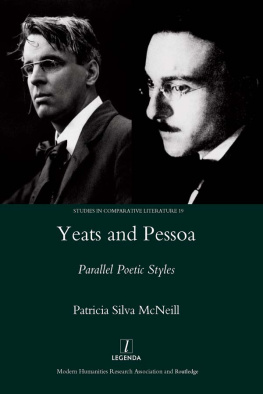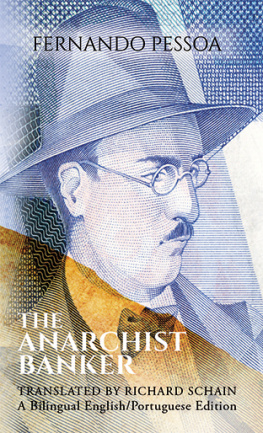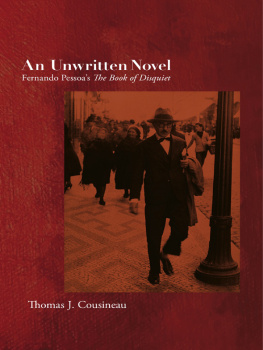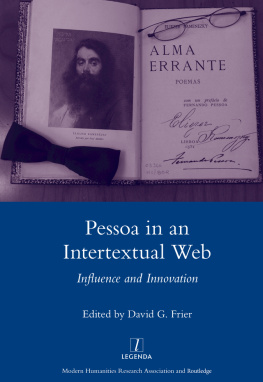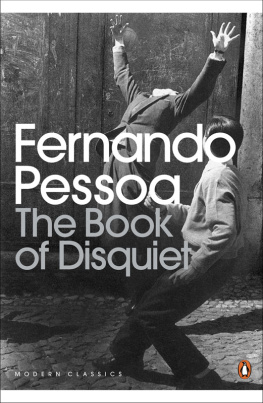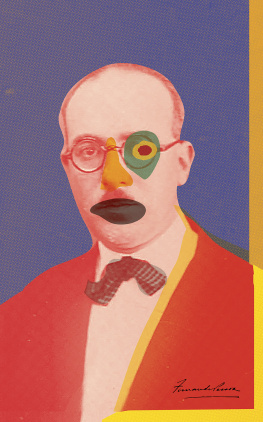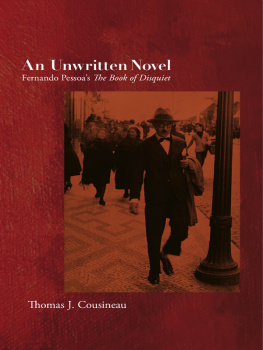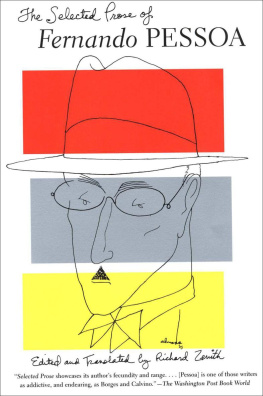Praise for The Selected Prose of Fernando Pessoa:
Imagine if, some day back in the 1950s, an American poet named John Ashbery had not only written a few of his own highly original poems, but in an ecstasy of creative surfeit, had invented three other poetsKenneth Koch, Frank OHara, and James Schylerand then, over the years, proceeded to write poems as them, even entire books. It sounds fantastic, but that is what Pessoa actually did. Nor was it just a whimsical creative exercise. In The Western Canon, that ultimate literary proving ground, Harold Bloom named Caeiro and de Campos as great poets in their own right.... Fascinating.
Brendan Bernhard, LA Weekly
Praise for Fernando Pessoa:
Portugals greatest poet since Camons... [with a] wide range of talent, craft, intellect, and poetic achievement.
Christopher Sawyer-Laucanno, The Boston Book Review
The saddest of our centurys great literary modernists and perhaps its most inventive ... the finest poet Portugal has ever produced.
The Boston Phoenix Literary Section
Pessoas writing, the whole of his extraordinary opus, [is] a major presence in what has come to be known as modernism in the European languages.... Almost any commentary of any length on Pessoas writings, sensibility, and imagination is bound to convey a glimpse, at least, of its intensity and elusiveness, its apparently endlessly unfolding hall of mirrors.
The New York Review of Books
If [Pessoa] never achieved such renown during his life, the years since he died have elevated him to a numinous status among European poets, and writers as idiomatically disparate as Jorge Luis Borges, Octavio Paz, and Antonio Tabucchi ... have acknowledged his potent sway.
The Times Literary Supplement
Fernando Pessoa (18881935) is one of the great originals of modern European poetry and Portugals premier modernist. He is also a strange and original writer. Other modernistsYeats, Pound, Eliotinvented masks through which to speak occasionally, from Michael Robartes, to Hugh Selwyn Mauberly to J. Alfred Prufrock. Pessoa invented whole poets.
Robert Hass, Poets Choice.
The Washington Post and San Francisco Examiner
Pessoa would be Shakespeare if all that we had of Shakespeare were the soliloquies of Hamlet, Falstaff, Othello and Lear and the sonnets. His legacy is a set of explorations, in poetic form, of what it means to inhabit a human consciousness.... What makes Pessoas thought and poetry compelling is not that he picks up and develops the forms and themes of Whitman and Emerson and retransmits our patrimony back to usthough this would be marvelousbut because in the poems and prose he has passed a judgment upon the twentieth-century rejection of individualism.
Richard Eder, Los Angeles Times Book Review
The amazing Portuguese poet, Fernando Pessoa ... as a fantastic invention surpasses any creation by Borges.... Pessoa was neither mad nor a mere ironist; he is Whitman reborn, but a Whitman who gives separate names to my self, the real me or me myself, and my soul, and writes wonderful books of poetry for all of them.
Harold Bloom, The Western Canon
[Pessoas] work is never more profound than when it is most ludicrous, never more heartfelt than when it is most deeply ironic.... Like Beckett, Pessoa is extremely funny.... His work is loaded with delights.
The Guardian (UK)
There are in Pessoa echoes of Becketts exquisite boredom; the dark imaginings of Baudelaire (whom he loved); Melvilles evasive confidence man; the dreamscapes of Borges.
The Village Voice Literary Supplement
The Selected Prose of FERNANDO PESSOA
ALSO BY FERNANDO PESSOA FROM GROVE PRESS:
Fernando Pessoa & Co.: Selected Poems
The Selected Prose of FERNANDO PESSOA
Edited and translated by
RICHARD ZENITH

Translation copyright 2001 by Richard Zenith
Introduction copyright 2001 by Richard Zenith
All rights reserved. No part of this book may be reproduced in any form or by
any electronic or mechanical means, including information storage and
retrieval systems, without permission in writing from the publisher, except by
a reviewer, who may quote brief passages in a review. Any members of
educational institutions wishing to photocopy part or all of the work for
classroom use, or publishers who would like to obtain permission to include
the work in an anthology, should send their inquiries to Grove/Atlantic, Inc.,
841 Broadway, New York, NY 10003.
Published simultaneously in Canada
Printed in the United States of America
Library of Congress Cataloging-in-Publication Data
Pessoa, Fernando, 18881935.
[Prose works. English. Selections]
The selected prose of Fernando Pessoa / edited and translated by Richard Zenith.
p. cm.
Includes bibliographical references.
eBook ISBN-13: 978-0-8021-9850-1
1. Pessoa, Fernando, 18881935Translations into English. I. Zenith, Richard.
II. Title.
PQ9261.P417 A288 2001
869.84108dc 21 2001018997
Design by Laura Hammond Hough
Grove Press
841 Broadway
New York, NY 10003
CONTENTS
E = original of Pessoa in English
F = original of Pessoa in French
Introduction
Introduction
Introduction
Introduction
Introduction
Introduction
Introduction
Introduction
GENERAL INTRODUCTION
Fernando Pessoa has the advantage of living more in ideas than in himself.
lvaro de Campos
Fernando Pessoa the Man and Poet
When he died on November 30, 1935, the Lisbon newspapers paid tribute, without fanfare, to the great Portuguese poet Fernando Pessoa, who was born in Lisbon in 1888. He was remembered for Mensagem (Message), a book of forty-four poems published in 1934, and for some 160 additional poems published in magazines and journals, several of which he helped to found and run. The author, a single man survived by a half sister and two half brothers, had the peculiarity of publishing his poetry under three different names besides his ownAlberto Caeiro, Ricardo Reis, and Alvaro de Camposwhich he claimed were not mere pseudonyms, since it wasnt just their names that were false. They were false personalities, with biographies, points of view, and literary styles that differed from Pessoas. They were names that belonged to invented others, whom their inventor called heteronyms. Pessoa also published over a hundred pieces of criticism, social commentary, and creative prose, including passages from The Book of Disquiet, whose authorship he credited to Bernardo Soares, assistant bookkeeper in the city of Lisbon. Another peculiarity about this authormentioned by the literary compeer who delivered the brief funeral addresswas that he wrote poems in English, some of which he published in chapbooks, for the benefit (according to the compeer) of the literary cercles of serene Albion. In fact, scarcely anyone in Portugal had read them. French was the second language of those who had one.
Still another peculiaritythis one a complete secretwas that Pessoas death marked the birth of a far larger writer than anyone had imagined. It was a slow birth that began only in the 1940s, when Pessoas posthumous editors opened up the now legendary trunk in which the author had deposited his legacy to the world: twenty-nine notebooks and thousands upon thousands of manuscript sheets containing unpublished poems, unfinished plays and short stories, translations, linguistic analyses, horoscopes, and nonfiction on a dizzying array of topicsfrom alchemy and the Kabbala to American millionaires, from Five Dialogues on Tyranny to A Defense of Indiscipline, from Julian the Apostate to Mahatma Gandhi. The pages were written in English and French as well as in Portuguese, and very often in an almost illegible script. The most surprising discovery was that Pessoa wrote not under four or five names but under forty or fifty. The editors timidly stuck to poetry by the names they knewAlberto Caeiro, Ricardo Reis, lvaro de Campos, and Pessoa himselfand further limited their selection to manuscripts that were easy to transcribe. It wasnt until the 1980s that reliable, relatively complete editions of poetry by the main heteronyms began to appear, and no such edition has yet appeared for the poetry signed by Pessoa himself, much of which still needs to be lifted from the manuscripts. Pessoas English heteronyms and his one French heteronym remained virtually unpublished until the 1990s, when many of the minor Portuguese heteronyms also began to make their way into print.
Next page

